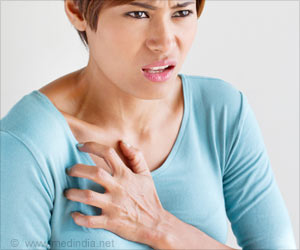Highlights
- Extreme emotional and physical triggers can cause a heart attack.
- In an international study involving many countries, participants reported experiencing certain triggers prior to a heart attack.
- The triggers appeared to independently increase a person's heart attack risk beyond those posed by other risk factors, including age, smoking, obesity, high blood pressure and other health problems.
- Maintaining physical well-being by regular exercise and emotional wellness through calming and relaxation techniques are key to a healthy body and mind.
The association was stronger, with triple the risk of developing a heart attack if the person engaged in heavy physical exertion while experiencing anger or emotional upset.
"This large, nearly worldwide study provides more evidence of the crucial link between mind and body," said Barry J. Jacobs, Psy.D., an American Heart Association volunteer and director of behavioral sciences at the Crozer-Keystone Family Medicine Residency Program in Springfield, Pennsylvania.
Anger is a very powerful emotion which is necessary for survival. It is a natural and conditioned response to a perceived threat or harm. It becomes problematic when it starts to affect or interfere with the individual’s daily life-activities, relationship with others, feelings and behavior.
Anger varies in intensity from mild irritation to intense fury and rage. When a person gets angry, it increases heart rate, blood pressure and brings about changes in the level of hormones like adrenaline and cortisol. This can impact the blood pressure and heart rate. Excess anger, under the wrong conditions, can cause a life-threatening heart attack.
- Expressing - Dealing with anger by being assertive and not aggressive is the ideal way to express it. In this process, you are respectful to yourself and others.
- Suppressing - Suppressing anger should be ideally done by directing your thoughts towards something positive and forgetting about the trigger. But this unexpressed anger can always take a toll on your physical as well as emotional health.
- Calm - Engaging in techniques to calm yourself, to lower heart rate and let the feelings subside.
For the study, researchers analyzed data from 12,461 people with an average of 58 years. These patients had participated in INTERHEART-a study consisting of patients with first ever heart attacks across 52 countries.
These triggers appeared to independently increase a person's heart attack risk beyond those posed by other risk factors, including age, smoking, obesity, high blood pressure and other health problems. Extreme emotional and physical triggers are thought to have similar effects on the body.
"Both can raise blood pressure and heart rate, changing the flow of blood through blood vessels and reducing blood supply to the heart" Smyth said. "This is particularly important in blood vessels already narrowed by plaque, which could block the flow of blood leading to a heart attack."
Blood pressure is the lateral pressure exerted by the blood against the walls of the arteries. The blood pressure is the highest when the heart pumps blood into the arteries and lowest when the heart relaxes. A normal blood pressure reading is 120/80mm Hg.
A reading of 140/90mm Hg or higher is considered high. Many years of high blood pressure or hypertension can damage walls of the arteries making them stiff and narrow. The arteries carrying blood to the heart also becomes affected and it reduces the blood flow to the heart triggering heart attack.
People who are at risk for a heart attack should avoid extreme emotional situations. One way many cope with the emotional ups and downs of a health condition is through peer support and talking with others who are facing similar challenges. This can be very helpful in better management of emotions.
Regular physical activity has many health benefits, including the prevention of heart disease and so one should continue to engage in such activities. However, it is recommended that a person who is angry or upset should not go beyond their normal exercise routine to extremes of activity, just to blow off the steam.
Limitations
- Participants had to recall their triggers. After a heart attack, a person may be more inclined to say they experienced a trigger than they otherwise would be.
- Participants were not given any descriptions of being angry or emotionally upset or of heavy physical exertion. They were all self-defined triggers which appear to have the same effect across countries and ethnicities.
Tips for a Healthy Heart
- Identify Triggers - Identify the circumstances that lead to anger or other emotions. It could be a person or a situation. Identifying the trigger helps to establish a pattern which can be avoided.
- Calming Techniques - Engaging in calming techniques like relaxation by visual imaging from your memory or using imagination, breathing exercise, meditation and yoga.
- Identify Solutions - Instead of focusing on the problems that trigger emotions, it is better to accept the situation and look for solutions.
- Physical Activity- Engage in regular physical activity. It helps to tone muscles and control blood pressure. It also boosts mental health and eases depression and anxiety related symptoms.
- Eating Healthy - Healthy diet can help in weight management and maintaining healthy levels of blood pressure and cholesterol.
- Cut Down on Alcohol Consumption and Smoking - Alcoholism and smoking are the leading causes of cardiovascular diseases, coronary heart disease and stroke.
- Seek Professional Help - Seek medical help if your emotions get out of control if you become overwhelmed. They can help in developing personal strategies for setting and achieving reasonable health improvement goals.
- Anger - (https://www.mentalhealth.org.uk/a-to-z/a/anger)
- Controlling Anger - (http://www.apa.org/topics/anger/control.aspx)
- Anger Management - (http://www.mayoclinic.org/healthy-lifestyle/adult-health/in-depth/anger-management/art-20045434)
- Mental Health and Heart Health - (http://www.heart.org/HEARTORG/HealthyLiving/StressManagement/HowDoesStressAffectYou/Mental-Health-and-Heart- Health_UCM_438853_Article.jsp#.V_ek7Oh97IU)
- Information on Heart and Mental Health - (https://www.bhf.org.uk/heart-health/preventing-heart-disease/heart-and-mental-health)















